|
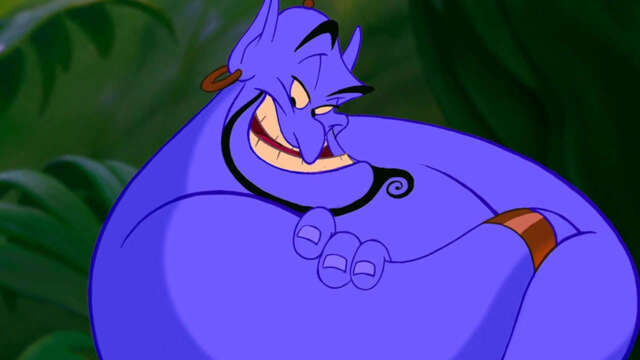
It is 2023, and though much less hostile than they used to be, the console wars still rage on, inexplicably firing up every time a port of a Capcom game is missing a strand of Leon Kennedy’s silken locks, or what have you. Fact is, even as insufferable as an Xbox/Sony argument can get now, no gaming generation since has known the sheer strife of the 16-bit days--if for no other reason than most games that come out for multiple systems now are, truly, the same game, plus or minus a few performance issues. Back in the bad old days of the 16-bit era, though, not only was it a crapshoot if the same game on a different platform would look the same, sound the same, have the same features, or get censored for some obtuse reason, but there wasn’t a guarantee you would even get the same game. Imagine something like Alan Wake 2, except Saga Anderson’s chapters were on PS5 and Alan’s chapters were on Xbox. That sounds absurd now. Back in the '90s, this was every Tuesday. This year, Disney’s Aladdin turns 30. It's a still-smoldering battlefield of the old console wars, when the Genesis version was a Virgin Interactive title with the full force of Disney’s animators, and the SNES got a Capcom platformer designed by some nobody named Shinji Mikami. But it was far from alone, and with three decades of distance, it’s time to settle some old scores, and figure out which system had it best with 15 16-bit games that shared a name, and not much else.
The Jungle Book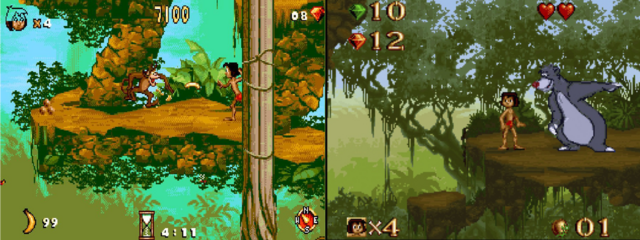
On a first impression, these are both pretty much on par, with the only major difference being a better field of view on Genesis, and better sound on SNES. And then you actually start playing it. The Genesis version is a collect-a-thon where you have to find a certain number of gems scattered throughout each stage, but it’s one of the better ones where the stages are well-crafted, the difficulty is in that nice sweet spot between forgiving and challenging, and your reward each time is a little cutscene explaining where we’re at in the movie. The SNES version may look and sound a little prettier, but it plays like it hates you, specifically. The hit detection is harsh, Mowgli can only take four hits before dying, and not being able to tell if a boss is about to die due to lack of an indicator makes those fights feel like they take hours. And thus did we learn our most enduring lesson from the 16-bit console wars, kids: looks ain’t everything. Winner: Genesis
Sunset Riders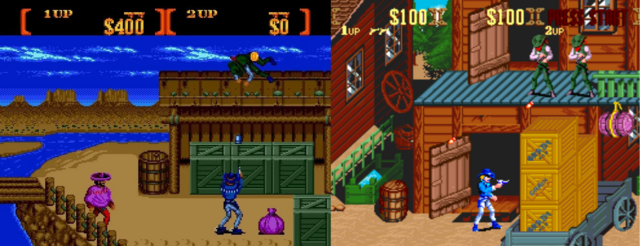
Sunset Riders is far from the first name on the list of Konami properties that deserve some more time in the sun, but it’s definitely one of the most unique. Think Red Dead Contra, and you’ve got the gist. While the arcade game is an underrated banger, neither one of the home ports could really deal in lead the way they were supposed to. The SNES comes closest, though, holding onto the voice clips, all of the levels from the arcade, and all four playable characters–granted, three of ‘em are the same blonde cowpuncher in a different outfit, but, still! Let it not be said the Genesis didn’t put up a valiant fight, making up for the pared-down presentation and audio/visual shortcomings with some extended levels (including an excellent, moody shootout in the rain leading up to the final boss), and the ability to continue right from the spot of your death (the SNES forces you back to the beginning of each stage if you die). It’s also not censored the way the SNES game is, though one of those censored bits is a stage where you shoot down dozens of Indigenous folks on the way to a boss named "Chief Scalpum", and sweet fancy Moses, it cannot be emphasized enough how bad of a look that is in 2023. Still, the Genesis port’s shortcomings are dealbreakers, in the end. Winner: SNES
Batman Returns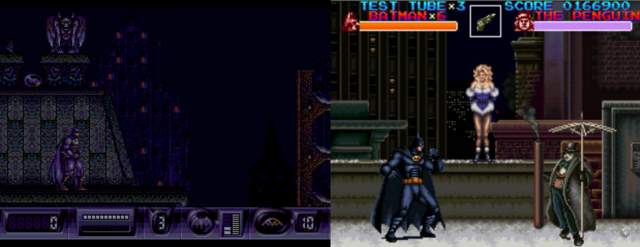
You’d think, after Sunsoft absolutely crushed it with the Batman ‘89 tie-in game on Genesis, handing them Batman Returns on a silver platter would’ve been a no-brainer. But nope, the Genesis tie-in game for the sequel is rough. The graphics are pixely, the enemies indistinct, the level design confusing as hell, and way too many gadgets for what could and should’ve been a nice accessible action platformer. It’s a mess. By contrast, the Konami-developed SNES game is about as close to perfection as one could expect: just the absolute ideal of what a hard-hitting side-scrolling arcade-style beat-’em-up based on Batman Returns should be, complete with cutscenes from the film, a Danny Elfman-y score, and all sorts of Bat-gadgets that are actually fun and easy to use. Hell, they even let you do that little trick with the grappling hook Bats uses to save Selina Kyle. Winner: SNES
The Adventures of Batman & Robin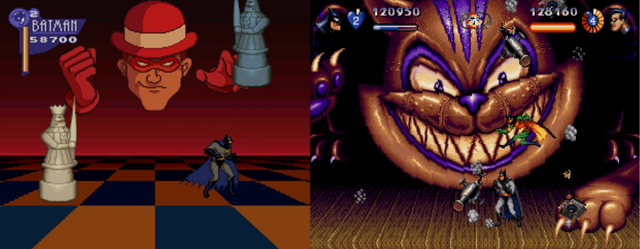
Now, we've got a fight on our hands. The SNES game from Konami was everything one could imagine from a Batman: The Animated Series game. Beyond being absolutely beautiful to look at and listen to, accurate to the cartoon on a shocking scale, it’s also one of the few pre-Rocksteady Batman games where Bats had to actually deal with problems with his utility belt more than with punches and kicks. There’s still a bunch of that, mind you, but the changes in pace made for a more immersive game than anyone expected. Even that groin-punch of a Riddler labyrinth can’t sour the experience too much. By contrast, you could plug literally any two characters into Sega’s Adventures of Batman & Robin, and it would still feel like the same side-scrolling Contra-esque shooter. Having said that, holy hell, what a side-scrolling shooter it is. Even beyond being one of the most visually striking games Genesis would ever pump out, and an absolute nailbiter in terms of challenge, the soundtrack, from future Hitman/Assassin’s Creed/Borderlands composer Jesper Kyd, is a thumping techno-industrial banger that goes harder than even necessary. It may not be a terribly great Batman game in the strictest sense, and hopefully the person responsible for making B the jump button instead of C is having a terrible day, but it’s hard not to be impressed by everything it’s doing. We’re inclined to hand it to Sega on this one, just because of how far it’s pushing the envelope relative to the hardware, but this one’s a photo finish. Winner: Genesis
Jurassic Park
Sure, we could sit here and make comparisons between the two basic experiences. The Genesis game is a broken--albeit beautifully animated--Flashback-esque platformer where Grant gets tossed around by dinosaurs while trying to stick tranquilizer darts in anything that moves. Meanwhile, the SNES game is an odd, top-down Zelda-type thing with some ambitious-for-the-time FPS sequences when players go indoors, and a soundtrack that sounds stolen from a Rainforest Cafe’s dumpster. But real talk, y’all, it is impossible to argue with “The Genesis version lets you play as a raptor.” Winner: Genesis
Super Turrican/Mega Turrican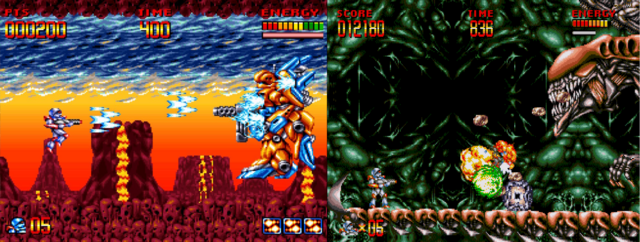
To be clear up front, Turrican is one of those games you should play in any form if you’re into run-and-gun games, as both the Genesis and SNES games are worthy. That said, despite telling the same story and sharing a ton of stages, enemies, and weapons, the Genesis game has a little more going on under the hood, with a darker art style, anime intros and endings, bigger environments to explore, level design that encourages it, more bosses to fight, a better array of weaponry, a weird prog rock soundtrack, and a grappling hook mechanic. As we are all aware, grappling hooks make everything better. The SNES game is still cool in its own right, but it’s shorter than the Genesis game by about 1/3rd, and the way so much of advancement is based around finding the hidden platforms scattered around the environment just isn’t as satisfying as using the grappling hook. Winner: Genesis
Sparkster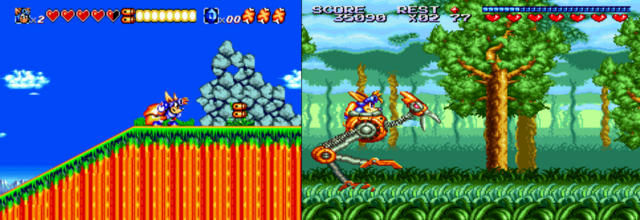
To be fair, Konami had its work cut out for it making any sequel to Rocket Knight Adventures, a.k.a. one of the best mascot platformers ever crafted, and with over 13 years separating us from Konami’s last milquetoast attempt, it feels wrong to even complain about what we got. Regardless, as solid as the Genesis version still is, the way you spend half the game waiting for your rockets to fully charge, the irksome slot machine mechanic, and the inexplicably cramped level design all do that game no favors. The SNES version has a little bit of that latter problem too, along with a slowdown issue whenever the screen gets too busy, but it still feels way more of a piece with the original Rocket Knight Adventures, from the heroic score, the steampunk art style, the humor, and the wild ways the game would take advantage of Mode 7. Winner: SNES
Shadowrun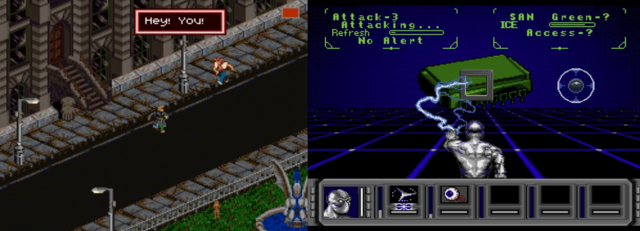
The Genesis version had the grungy look of the world and the top-down gameplay down pat. Once you get to the point you’re doing actual Shadowruns for money and glory, it feels a hell of a lot like a Cyberpunk 2077 prototype. Still there’s a barrier of entry at the outset, it gets real grindy real fast, and it’s easy to lose the overarching plot of finding your brother’s killer in all the mayhem. By comparison, the SNES game is way more of a traditional point-and-click game, and just feels sparse and linear. Still, the setup, where you wake up in a morgue and have to roam the streets trying to piece together who you are, is riveting as hell. The dialogue is sharp and often funny, and it’s way less effort to get to the bottom of things there (despite upgrades being expensive as hell). Both games are on to something, though. If you could somehow smash both the Genesis and SNES games together and pretty up the graphics, you’d have… well, you’d have Shadowrun Returns, actually, and that’s available on modern hardware. Between these two, though, the SNES port’s respectable, for sure, but having now gotten the more polished version of what this one’s going for, it’s harder to go back to obsessively running a cursor over filing cabinets for hours on end. Winner: Genesis
Teenage Mutant Ninja Turtles: Turtles In Time/The Hyperstone Heist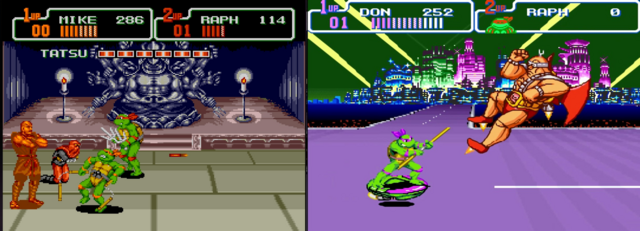
This one’s an odd situation. While it doesn’t share the subtitle, Hyperstone Heist is basically Konami trying to cram as much of Turtles In Time onto the Genesis as possible, and adding some filler to make up for what they couldn’t. The result is a few levels that make the jump largely intact (Alley Cat Blues, Starbase, the elevator part of the Technodrome), some just get rejiggered (Prehistoric Turtlesaurus and Skull & Crossbones becoming one ghost ship level), the bosses get shuffled around, and all of the dope Mode 7 stuff gets traded in for one (admittedly pretty fun) new level and boss fight with Tatsu from the live-action Ninja Turtles flicks. God bless Konami for trying. There’s nothing particularly bad about Hyperstone Heist, aside from the painfully garbled voice clips. But it just never rises above being Diet Turtles In Time. If you only had a Genesis back in the day, you were fine. If you had a choice, there was only ever one option, and it’s the one that let you play Neon Night Riders. Also, sidenote, but it's funny to think that stage takes place in 2020. We could’ve had hoverboards. Instead, we got COVID. Winner: SNES
Teenage Mutant Ninja Turtles: Tournament Fighters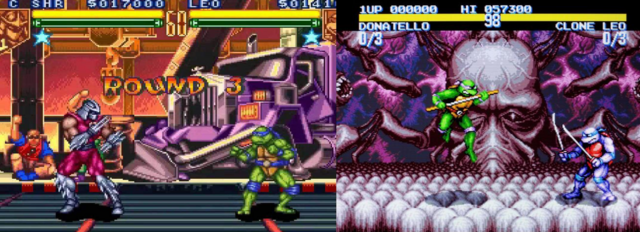
This, on the other hand, is a complete dog walk for the SNES. The Genesis version of Tournament Fighters is a stodgy, clunky, disaster that not only doesn’t take advantage of the six-button controller, but one of the face buttons on the regular Genesis pad is a useless taunt. Also, Casey Jones is OP to the point where it’s wild he’s not the actual final boss. How a Genesis game can come out in 1993 and be outclassed by the likes of Deadly Moves is astonishing. The SNES version is Gallant to the Genesis game’s Goofus. A full-fledged story mode, turbo speeds, Street Fighter-esque intuitive controls, a big, fun roster of TMNT deep cuts (fun trivia: Aska was originally supposed to be Mitsu from the live-action Turtles III), and a roided-up Rat King as a boss. Winner: SNES
Alien 3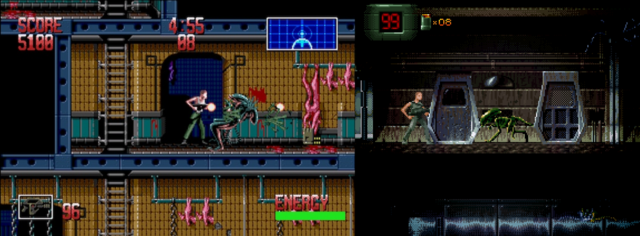
Admittedly, Probe Software kind of had their work cut out for them, trying to make a game out of the defiantly non-action-packed David Fincher film. Turning the Genesis game into a generic, arcadey collect-a-thon where Ripley’s running around saving prisoners from unplanned xenomorph parenthood isn’t exactly an illogical move. Still, the SNES version is at least trying something new, playing more like a dumbed-down Super Metroid. There’s more exploration to do, maps to download, and missions to accept. The weapons are effective but aren’t as spray-and-pray as you’d expect them to be, which makes things a bit more tense. It can get as repetitive as the Genesis version, but it’s at least repetitive in an engaging way, whereas you can sleepwalk your way through the Genesis game until it’s time to fight a boss. The presentation puts the SNES game over the top though, with an intro that actually effectively tells the story of the film, and a soundtrack that’s absolutely shocking in how well it represents the film’s score. Winner: SNES
Animaniacs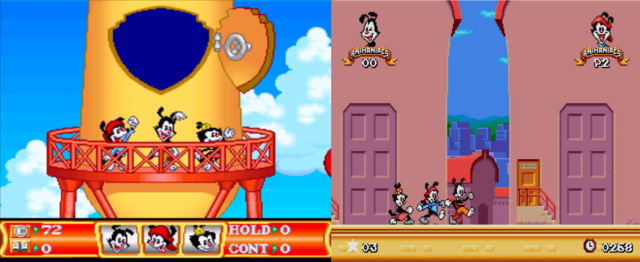
Another close call. The Genesis version is a puzzle platformer akin to a Limbo or Inside, but instead of eldritch childhood terrors, the Warner Brothers (and the Warner Sister) all have distinct abilities they use to sneak their way past Rita and Runt, or blow kisses at film-set lackeys so they can jump on their toupees, or use the Hip Hippos to bounce onto platforms. The SNES game is much more of a traditional platformer, where one hit loses a Warner sibling. The Genesis game is the better, more involved game, for sure, and with plenty of story and obscure jokes in between, but the SNES looks, sounds, and feels more like a playable episode of the cartoon. The Genesis might just win it based solely on being a tie-in game based on a wacky '90s cartoon that starts with a Marshall McLuhan reference, but the SNES version is a fun time all its own. Winner: Genesis
The Terminator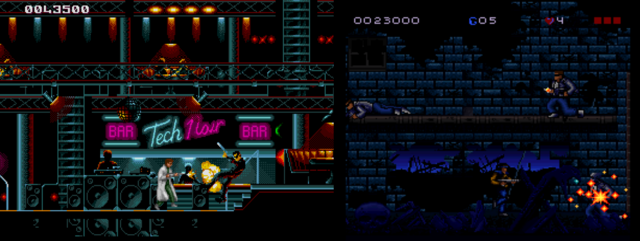
Both of these are pretty generic side-scrolling shooters, but the Genesis version at least has better animation, enemy variety, and a killer soundtrack on its side. Aside from the SNES version including a couple of weak driving sequences and an admirable attempt to reinterpret Brad Fiedel’s score, it pales in comparison on every level. (The Sega CD version beats ‘em both, though.) Winner: Genesis
Robocop vs. Terminator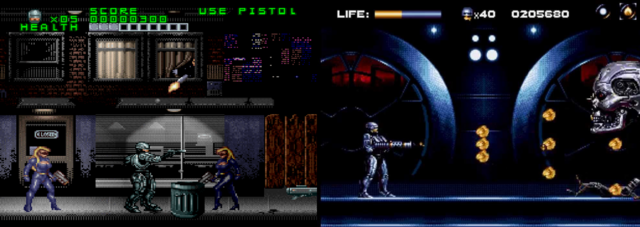
Much ink was spilled back in the 90s about Nintendo’s censorship policies, and how much ground they gave up to Sega in the console wars based solely on that. But even after Nintendo softened up in that regard, it’s pretty obvious Nintendo just wasn’t interested in getting too down and dirty with SNES games. So, with a game like Robocop vs Terminator, while the Genesis game is an unapologetically trashy splatterpunk shoot-'em-up, the SNES version, despite an attempt at playing more into the comic book origins of the crossover, is a slower, more conservative kind of experience that doesn’t really rise above “okay.” There’s nothing in the SNES game’s hours-long playtime that gives as much stupid joy as every time that sexy “Terminator!” sound byte plays on the Genesis game’s soundtrack. Winner: Genesis
Disney's Aladdin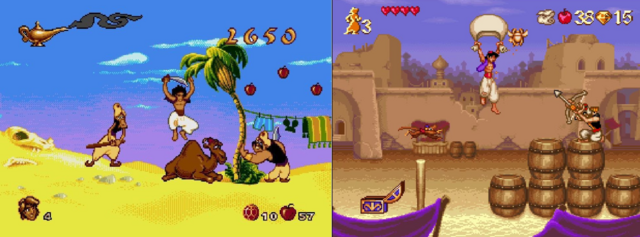
Back in the day, the Genesis Aladdin was virtually untouchable. The visuals of the game, with actual Disney animators lending their gifts, made it look like nothing else out there at that moment. The humor was captured, as was the mood. Even though the Genesis sound chip couldn’t make it sound like anything but, well, a Genesis game, hearing A Whole New World coming out of a video game still felt like magic. The SNES version just didn’t carry the same vibe, with its more generic animation. But just like we said with Jungle Book: Looks ain’t everything. And in 2023, it’s much clearer to see the Genesis game as gorgeous, but with fiddly melee combat, a too-floaty jump, and dodgy hit detection that really comes back to bite it in the ass in the later levels. The SNES game is harder, sure, but it’s the kind of hard where failing a jump is your fault. The SNES version is just a better-playing game. Just don’t get in a DeLorean and tell that to anybody in 1993. Winner: SNES
|




















